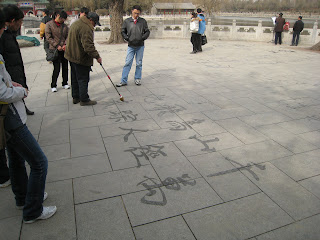Is the city or the people better looking?
Pingyao was a 12 hour night train southwest from Beijing, so it is a bit out there. A side effect of this is that Jon, being a tall white male, was a minor celebrity wherever he went. This started right on the train when he walked into the dining compartment and random people started excitingly greeting him and trying out their English.
At Pingyao, his celebrity status only increased, so much so that random girls would go up to Jon and ask to take their picture with him.
Jon is a minor celebrity. Meanwhile, I get charged 1 RMB less for bottled water.
In any event, the original reason we went to Pingyao was that it is the place the movie Raise the Red Lantern was shot. In fact, before going on the trip, the six of us all watched the movie together. (If you haven't seen the movie, it is kind of like a season of Survivor where the contestants are four concubines, the prize is sleeping with a 60 year old man, and the punishment for being voted off is you get hanged.) So on Sunday we went over to Qiao's mansion, the site of the filming.
Sure enough, there was a ton of Raise the Red Lantern paraphernalia all around. You could see the actual set, check out pictures of the actors, and even dress up as the people there. This might be a good time to mention that Jon and I, in a situation I will call anti-Man Jose style, went with four girls to Pingyao. Hm... four girls, four concubines in Raise the Red Lantern, costumes... can you see where this is going?
Bam!
Unfortunately, Jon and I got cajoled into dressing up also. We looked ridiculous, but perhaps because of this, Jon would walk around and people would ask for his picture every there of four minutes. This happened so often, he even told one girl that the picture would cost 3 bucks!
That will be sān kuài
And I could not resist getting a picture as well:
Looking very gangster
All in all, good trip!




















